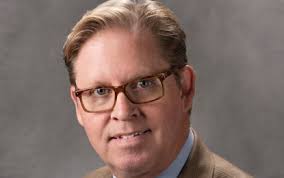An interview with Dan Lindblade, Greater Fort Lauderdale Chamber of Commerce
As part of its series “The Business of Climate Change,” which highlights the climate views of business men and women throughout the state, The Invading Sea spoke with Dan Linblade, president and CEO of the Greater Fort Lauderdale Chamber of Commerce and chairman of the Housing Authority of the City of Fort Lauderdale.
Here are some highlights from the interview.
From your view, how has climate change affected South Florida?
From the business perspective, engagement and education have been critical for the business community to really understand what the short-, medium-, and long-range impacts are for us to not engage on climate change issues and mitigation.
As a chamber, I created what I call a “legacy position” for us, so that I’ll never finish it in the time I have left here at the chamber, but I will at least have set a pathway for whoever follows me to connect the dots and really have an impact.
Tell us a little bit about the Greater Fort Lauderdale Chamber of Commerce and its priorities in regard to climate change and resiliency.

I’ve been pushing hard to create a collaborative with the Southeast Florida (Regional Climate Change) Compact and all the regulators to position South Florida to be the epicenter for solutions. And that’s really what my call to action is: that we, through all of our relations, through all of our brain trusts that we have here in South Florida, that we create the leverage to get worldwide talent to come in here and train us and bring new ideas, test new ideas.
So we created the International Resiliency Conference and Convention, which was supposed to be in December, and COVID kind of screwed that up. But that’s going to be a worldwide, multi-tiered convention and exposition, where the best and brightest come to South Florida to talk about innovation and solutions.
How will things like sea-level rise and changing weather patterns affect Florida’s economy in the future?
If we do nothing, it will basically shut us down. So that’s the risk. What really got me was when I saw what the insurance estimators and actuarials were looking at for inaction and basically pricing us out of our future.
We couldn’t afford residential real estate because we couldn’t insure it. We couldn’t secure a 30-year fixed-rate mortgage because it wasn’t actuarially sound because there was no mitigation going on. It’s a very complex system that we have set up in the United States and you can’t work them independently. That is why it’s so important that we have mitigation impacts.
How are businesses in your area responding to climate change and what are the most pressing concerns for business owners?
They were in the denial phase. Now they’re in the acceptance phase. And so we’re working through that through education and awareness. I think overall what they’re trying to do is, okay, what’s the price tag on this?
Because we can’t afford all of it, so where do we start? We’ve got to take one bite of the elephant at a time. I think, in general, there’s acceptance, but the awareness factor, we have a lot more people to inform and educate.
What are some possible solutions to these issues moving forward, and what do you think the Florida Legislature can do to help?
We have to have an officer, an office of resiliency. I think the governor put that in his budget this year for this session. There has to be someone who’s kind of steering the ship from a state level securing federal funding, prioritizing all of the issues that we have in our flood-control system and helping to raise awareness.
We want to map out where the needs are, where we have the biggest issues. We have to look at different ways of paying for this so that it’s not all on the property tax.
There’s lots of creative ways that we can get through it but that’s why cities need to have their house in order, so their bond rating will give them preferential interest rates. So I think that, in a nutshell, is the gist of it. Get your prioritization of the projects, what the cost-benefit value is, and then start to find them and knock them off one at a time.
Kevin Mims, a Florida-based freelance journalist, is the producer of “The Business of Climate Change.” He conducted this interview with Lindblade.
“The Invading Sea” is the opinion arm of the Florida Climate Reporting Network, a collaborative of news organizations across the state.




It’s good to see Dan Lindblade’s recognition of the profoundness and over arching impact of climate change, particularly manifest in rising sea level. Hopefully the program he describes will not confuse the many other important environmental issues with the singular challenge of rising sea level. Issues such as Everglades restoration, reducing carbon dioxide emissions, plastics in the ocean, and coral reef decline are all critically important, but have little if any relation to being prepared for the invading sea. For example, Everglades restoration is very valid, but is often misrepresented as a way to significantly delay or even stop rising sea level, which it cannot.